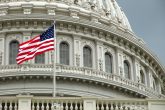January 06, 2023
How to Win Friends and Choke China’s Chip Supply
This article originally appeared in War on The Rocks.
On Oct. 7, the Biden administration took a risky gamble, introducing a sweeping set of new export controls that will reach deep into China’s advanced semiconductor production, supercomputing, and artificial intelligence ecosystems. These novel and ambitious restrictions usher in a new phase of technological competition with China.
U.S. officials should prioritize aligning controls with other major producer nations to target the most significant technology chokepoints and the areas where the risk of backfilling U.S. technologies is highest.
But they have been implemented unilaterally, without the support of any other country. A major South Korean firm has called the new controls “painful” and European officials have rebuked the United States for dictating export control policy. If Washington seeks to keep China as far behind as possible in critical technologies, it needs to persuade key partners in Europe and Asia to implement similar controls. The United States has bet that impairing China’s advanced technology capabilities now exceeds the benefits of retaining leverage over China that can be used in the future. This bet is predicated on the assessment that the controls are so sweeping, China cannot recover from them by developing equivalent capabilities on its own. This is undoubtedly true in the short-term, as the United States dominates the “tooling” or manufacturing necessary for advanced semiconductors, as well as the design of graphic processing unit chips critical for AI. But the long-term success of the U.S. strategy is on much shakier ground. U.S. technology chokepoints will become vulnerable over time. And if other countries do not implement similar controls, foreign firms will have a strong commercial incentive to backfill U.S. technology that can no longer be sold to the Chinese market.
Read the full article from War on The Rocks.
More from CNAS
-
The Section 702 economic risks that few are talking about
702 is vital to protecting the U.S. homeland and our allies from foreign threats....
By Daniel Silverberg & Elena McGovern
-
Sanctions by The Numbers: The Russian Energy Sector
Since 2014, the United States, the European Union (EU), and other like-minded nations have targeted the Russian energy sector with increasingly significant coercive economic m...
By Jocelyn Trainer, Nicholas Lokker, Kristen Taylor & Uliana Certan
-
Sharper: Regulating Technology
The pace of technological change presents both immense opportunity for private industry and complex challenges for national security. These technologies, including artificial ...
By Anna Pederson & Julia Arnold
-
Can Europe fund its defense ambitions?
The majority of European members of NATO are not spending as much on defense as they agreed to. But that may change as the European Union considers a move to a "war economy." ...
By Rachel Ziemba




